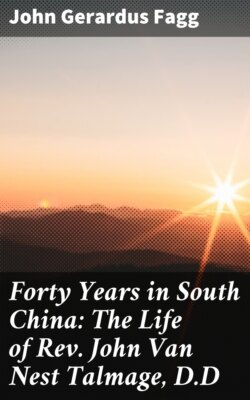Читать книгу Forty Years in South China: The Life of Rev. John Van Nest Talmage, D.D - John Gerardus Fagg - Страница 9
На сайте Литреса книга снята с продажи.
III. THE CITY OF THE "ELEGANT GATE"[*]
ОглавлениеTable of Contents
[Footnote *: the meaning of the two Chinese characters composing the name
Amoy.]
In a letter to the Sabbath-school of the Central Reformed Church, Brooklyn,
Mr. Talmage thus describes the southern emporium of the province of Fukien:
"Amoy is situated on an island of the same name. The city proper or citadel is about one mile in circumference. Its form is nearly that of a rhomboid or diamond. It is surrounded by a wall about twenty feet in height, and eight or ten feet in thickness, built of large blocks of coarse granite. It has four gates. The outer city, or city outside of the walls, is much more extensive. Its circumference, I suppose, is about six miles.
"The streets are not so wide as the sidewalks in Brooklyn. Some of them are so narrow that, when two persons, walking in opposite directions, meet each other, it is necessary for the one to stop, in order that the other may pass on. The most of the streets are paved with coarse granite blocks, yet on account of the narrowness of the streets, and the want of cleanliness by the great mass of the inhabitants, the streets are usually very filthy.
"This part of Amoy island is rugged and mountainous, and interspersed with large granite rocks. Some of them are of immense size. It is in such a place that the city has been built. Many of these rocks are left in their natural position, and overhang the houses which have been built among them. The ground has not been leveled as in Brooklyn, consequently the greater part of the streets are uneven. Some of them are conducted over the hills by stone steps. Near our residences, one of the public streets ascends a hill by a flight of thirty-six steps. On account of this unevenness of the streets as well as their narrowness a carriage cannot pass through the city of Amoy. Instead of carriages the more wealthy inhabitants use sedan chairs, which are usually borne by two bearers. The higher officers of government, called 'Mandarins,' have four bearers to carry them. The greater part of the inhabitants always travel on foot. The place of carts is supplied by men called 'coolies,' whose employment is to carry burdens. The houses, except along the wharves and a few pawn-shops farther up in the city, are one story.
"There are no churches here, but there are far more temples for the worship of false gods, and the souls of deceased ancestors, than there are churches in Brooklyn.
"Besides these, almost every family has its shrine and idols and ancestral tablets, which last are worshipped with more devotion than the idols. In consequence of their religion the people are degraded and immoral. One-third of all female children born in the city of Amoy are slain. In the villages throughout this whole region, it is supposed that about one-half are destroyed. They do not exhibit sympathy for each other and for those in distress, which is enjoined by the Bible, and which, notwithstanding all its defects, is the glory of Christian communities. I have seen a man dying on the pavement on a street, almost as densely thronged as Broadway, New York, and no one of the passers-by, or of the inhabitants of that part of the street, seemed to notice him or care for him more than if he had been a dog."
